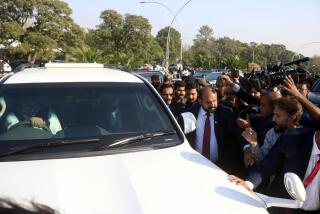Chronology
- Share via
Key events in Benazir Bhutto’s career:
April 4, 1979: Benazir Bhutto’s father, Zulfikar Ali Bhutto, is executed after being convicted of conspiring to murder an opponent in a trial seen as tainted, two years after his ouster as premier in a coup.
April 10, 1986: Benazir Bhutto returns from exile in London to lead the Pakistan People’s Party, founded by her father.
Dec. 2, 1988: Bhutto’s party wins parliamentary elections and at 35, she becomes the first female prime minister of a Muslim nation.
Aug. 6, 1990: President Ghulam Ishaq Khan dismisses Bhutto’s government, alleging corruption and a failure to control ethnic violence.
Oct. 19, 1993: Bhutto takes the oath for a second term as prime minister.
Nov. 5, 1996: President Farooq Leghari dismisses Bhutto’s second administration amid accusations of nepotism and undermining the justice system.
April 15, 1999: A court finds Bhutto guilty of corruption while she is out of the country. The conviction is later quashed, but Bhutto remains in exile.
Oct. 12, 1999: Gen. Pervez Musharraf, head of the armed forces, seizes power from Prime Minister Nawaz Sharif in a bloodless coup.
Oct. 5, 2007: Musharraf signs a corruption amnesty covering other cases against Bhutto, opening the way for her return and a possible power-sharing agreement.
Oct. 18: Bhutto returns.
Oct. 19: She narrowly escapes a suicide bombing that kills more than 140 people during a homecoming procession in Karachi.
Nov. 9: Police throw barbed wire around Bhutto’s house to keep her from speaking at a rally to protest Musharraf’s imposition of emergency rule. Security forces round up thousands of her supporters.
Nov. 13: Authorities put Bhutto under house arrest for the second time in a week. She urges Musharraf to resign and says it is likely her party will boycott the January parliamentary elections. She also indicates a desire to build an alliance with other opposition leaders, including Sharif.
Nov. 30: Bhutto presents her election manifesto, dimming the prospect of an opposition boycott.
Dec. 1: Bhutto launches her election campaign, urging resistance against Islamic militancy.
Dec. 8: Gunmen kill three people in an attack on one of Bhutto’s party offices.
Dec. 9: Sharif’s party announces that it will participate in the elections, after failing to persuade Bhutto to join a boycott.
Dec. 25: Bhutto accuses Musharraf of failing to stop the spread of Islamic militants and promises to crack down on such groups if she wins the elections.
Dec. 27: Minutes after Bhutto addresses thousands of supporters in Rawalpindi, she is assassinated.
Source: Associated Press
More to Read
Sign up for Essential California
The most important California stories and recommendations in your inbox every morning.
You may occasionally receive promotional content from the Los Angeles Times.










